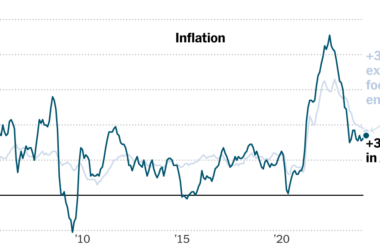When President Biden introduced his plan to offer pupil debt aid for 43 million debtors practically two years in the past, there was a chunk to his program that attracted much less consideration: a brand new pupil mortgage compensation program that may lower month-to-month funds in half for thousands and thousands.
The compensation program, known as SAVE, was meant to change into a everlasting fixture of the federal pupil mortgage system, providing a extra reasonably priced path to compensation, significantly for lower-income debtors. However two teams of Republican-led states have filed separate lawsuits to dam the SAVE program — together with lots of the states that challenged Mr. Biden’s $400 billion debt cancellation plan, which was struck down by the Supreme Courtroom final yr.
Missouri, together with six different states, filed suit on Tuesday within the U.S. District Courtroom for the Jap District of Missouri, in search of to upend this system. That follows a problem filed by 11 different states, led by Kansas, in late March. Each fits argue that the administration has once more exceeded its authority, and the compensation plan is simply one other backhanded try to wipe money owed clear.
“But once more, the president is unilaterally making an attempt to impose a very costly and controversial coverage that he couldn’t get by Congress,” the plaintiffs stated within the criticism filed in Missouri.
The most recent authorized problem landed only a day after the Biden administration renewed its efforts to supply extra intensive debt aid in an try to make good on a marketing campaign promise throughout an election yr. That effort, which joins current packages providing focused aid, can be anticipated to be challenged.
The SAVE plan, which opened to debtors in August and has greater than eight million enrollees, isn’t a novel thought: It’s an income-driven compensation program based mostly on a roughly 30-year-old design that ties debtors’ month-to-month funds to their revenue and family dimension. However SAVE has extra beneficiant phrases than earlier plans. Already, 360,000 enrollees have acquired approval to have the rest of their money owed canceled, totaling $4.8 billion, after having made funds for 10 to 19 years.
Blocking the plan might throw thousands and thousands of debtors’ monetary lives into disarray and create complications for mortgage servicers. A number of authorized specialists stated they felt that this system was on firmer authorized floor than the plan blocked by the Supreme Courtroom. That program was based mostly on emergency powers derived by the HEROES Act, which President Donald J. Trump invoked to pause pupil mortgage funds in the beginning of the pandemic in 2020.
The Schooling Division declined to touch upon pending litigation. However it stated Congress gave the division the authority to outline the phrases of income-driven compensation plans, which regulate funds to a borrower’s revenue, in 1993, and that the SAVE plan was the fourth time it had used that authority.
Nonetheless, regulation professors and client advocates concede that the authorized panorama has shifted, leaving extra questions concerning the plan’s destiny.
Right here’s what we all know:
Revenue-driven compensation plans are roughly 30 years outdated. Why are teams suing now?
Something associated to pupil mortgage aid has change into politically charged. Right here, the states argue the SAVE plan is illegal largely due to its excessive projected prices, which they stated ought to require approval by Congress.
The Congressional Finances Workplace estimated that SAVE would price $261 billion over 10 years, however one other evaluation got here up with a a lot bigger quantity.
Economists for the Penn Wharton Finances Mannequin, a analysis group on the College of Pennsylvania, projected it will price $475 billion over the identical interval — with roughly $235 billion of that attributed to the elevated generosity of SAVE relative to current plans, in line with Kent Smetters, a professor at Wharton and the college director of the Penn Wharton Finances Mannequin.
The authorized challenges “are all principally premised on the concept if it’s costly, it’s unlawful,” stated Persis Yu, deputy government director on the Pupil Borrower Safety Middle, an advocacy group. “That’s not likely the regulation.”
How is that this plan completely different from those that got here earlier than it?
SAVE’s phrases are extra favorable: It reduces funds on undergraduate loans to five p.c of a borrower’s discretionary revenue, down from 10 p.c within the plan it changed, referred to as REPAYE. After month-to-month funds for a set variety of years — often 20 — any steadiness is forgiven. (Graduate college debtors nonetheless pay 10 p.c over 25 years.)
This system shortens the compensation time period for individuals who initially borrowed $12,000 or much less to 10 years, at which level any remaining debt is canceled.
SAVE additionally tweaks the payment formula so extra revenue is protected for a borrower’s primary wants, lowering funds general. Which means debtors who earn lower than 225 p.c of the federal poverty guideline — equal to what a $15-an-hour employee earns yearly, or $32,800 or much less for a single individual — haven’t any month-to-month fee. Underneath REPAYE, much less revenue was shielded, as much as 150 p.c of federal poverty pointers.
About 4.5 million of the roughly eight million SAVE enrollees haven’t any month-to-month fee, in line with the White House.
The states in search of to dam this system argue that this successfully makes extra of the loans act like grants.
What is going to decide whether or not the circumstances transfer ahead?
Earlier than a courtroom can get to the arguments of a case, the plaintiffs should set up that they’ve standing to sue — that’s, they’re struggling a concrete hurt that may be remedied by the courts.
Some authorized specialists stated that Missouri could have a greater likelihood at passing this check — in any case, it succeeded when the states challenged Mr. Biden’s broad debt aid program. Although a district courtroom in that case initially discovered that the states didn’t have standing to sue, the choice was reversed by an appeals courtroom and the plan was placed on maintain. Later, the Supreme Courtroom held that Missouri had standing as a result of it will have misplaced income from the Missouri Larger Schooling Mortgage Authority, or MOHELA (a federal mortgage servicer, which is taken into account an arm of that state), if the debt cancellation proceeded. That was sufficient to let the case transfer ahead, and Missouri is making a considerably related argument right here.
“That could be a confirmed path to standing when the federal government guarantees to wipe away the money owed of tens of thousands and thousands of individuals — nevertheless it’s not clear that it is going to be profitable right here, since decrease month-to-month funds should not the identical as complete debt aid,” stated Mike Pierce, government director of the Pupil Borrower Safety Middle.
In addition to arguing that Missouri would lose cash except debtors stayed in debt longer, the go well with additionally contends the plan would harm the states’ capability to draw workers to authorities jobs as a result of the Public Service Mortgage Forgiveness Plan — which permits public sector and nonprofit staff to have federal pupil debt balances forgiven, typically after 10 years of funds — will change into much less engaging when stacked alongside SAVE. (The go well with doesn’t point out that SAVE is a qualifying compensation program that can be utilized as a part of the Public Service Forgiveness Program, which frequently affords a fair shorter path to forgiveness than SAVE.)
The states additionally declare within the lawsuit that forgiveness will deprive them of tax income — a federal regulation efficient by 2025 exempts canceled pupil debt from taxation, and several other states’ legal guidelines observe federal taxation legal guidelines. However authorized specialists and advocates say the states might change their tax legal guidelines and accumulate the additional income.
May SAVE be struck down?
If both of the latest circumstances strikes ahead, the states will get their likelihood to argue that the Schooling Division overstepped its authority — more than likely, by turning to a authorized precept referred to as the “main questions doctrine,” which has been more and more invoked by conservative challengers in search of to curb the powers of the manager department. The thrust of that doctrine is that Congress should communicate clearly when it authorizes the manager department and its businesses to tackle issues of political or financial significance. Up to now, courts would sometimes defer to company interpretations of ambiguous statutes.
“The foremost questions doctrine has put a serious crimp on the manager department’s capability to innovate on longstanding packages and longstanding statutes,” stated Stephen Vladeck, a professor on the College of Texas Faculty of Regulation. “5 years in the past, the query we’d have requested is that if the interpretation was affordable. Now, the query is, ‘Is their authority clear?’ And that could be a tough — if not inconceivable — commonplace for businesses to fulfill, particularly for statutes Congress enacted years, if not many years, earlier than the key questions doctrine was a factor.”
“It’s going to be onerous for anybody to be assured,” he added, “that the brand new plan is secure simply because the authorized arguments in assist of it are robust.”
In 1993, Congress amended the Larger Schooling Act of 1965 and enabled Schooling Division to switch its income-contingent compensation plan, which was created to offer monetary aid to debtors vulnerable to falling behind on funds. Since then, the division has relied on that authority to create two different income-driven packages, together with Pay As You Earn (PAYE) in 2012 and the Revised Pay As You Earn (REPAYE) in 2015, each of which incrementally improved on the plans earlier than them.
“This statutory authority is not only a theoretical argument,” defined Mark Kantrowitz, a monetary support knowledgeable, who additionally stated he thought-about the authorized challenges too weak to succeed.
May the SAVE plan be suspended whereas a possible case is set?
The group of states led by Kansas have filed for a preliminary injunction, with the hope that the courts will briefly block all the SAVE program whereas the case is set. However that most likely received’t occur, a minimum of not in a method that may upset the soundness of the coed mortgage compensation system. The states must present their case is more likely to succeed, and the courts must weigh the hurt to debtors towards the hurt claimed by the states.
“Whereas they appear to be asking the courtroom to dam implementation of all elements of the SAVE plan, their greatest focus is on blocking the Division of Schooling from canceling debt underneath the plan, arguing that’s what is going to irreparably hurt states whereas the litigation is pending as a result of, as they put it, as soon as the debt is canceled, that egg can’t be unscrambled,” stated Abby Shafroth, co-director of advocacy on the Nationwide Shopper Regulation Middle.
Ought to debtors enrolled in SAVE — or contemplating enrolling — do something in a different way now?
Borrower advocates counsel specializing in what you may management — proceed to enroll within the compensation plan that makes most sense on your monetary state of affairs.
However remember the fact that the Biden administration plans to part out some income-driven compensation plans on July 1, when all of SAVE’s advantages take full impact. New debtors received’t be capable to enroll within the PAYE plan or the income-contingent plan (I.C.R.) after July 1, although debtors with father or mother PLUS loans will stay eligible — after they’re consolidated. The REPAYE plan has already been changed by SAVE.
The so-called income-based compensation plan, referred to as I.B.R., will stay open, although its phrases are typically not as favorable because the SAVE program.








